
THE ULTIMATE BIRTHSTONE GUIDES
Discover the gemstones of your birth month with the Ultimate Birthstone Guides! From January to December, uncover the knowledge of your modern and traditional birthstones that you probably never knew existed.

The Birthstones of August: Peridot, Spinel, and Sardonyx
Delve into the enchanting world of August birthstones, where beauty meets history and symbolism in a mesmerizing array of colors. While most months boast just one or two birthstones, August stands out with three dazzling gems! August babies are lucky to have peridot, spinel, and sardonyx as their birthstones, each radiating its own unique history, symbolism, and charm. Dive in to discover everything you need to know about these captivating gemstones.
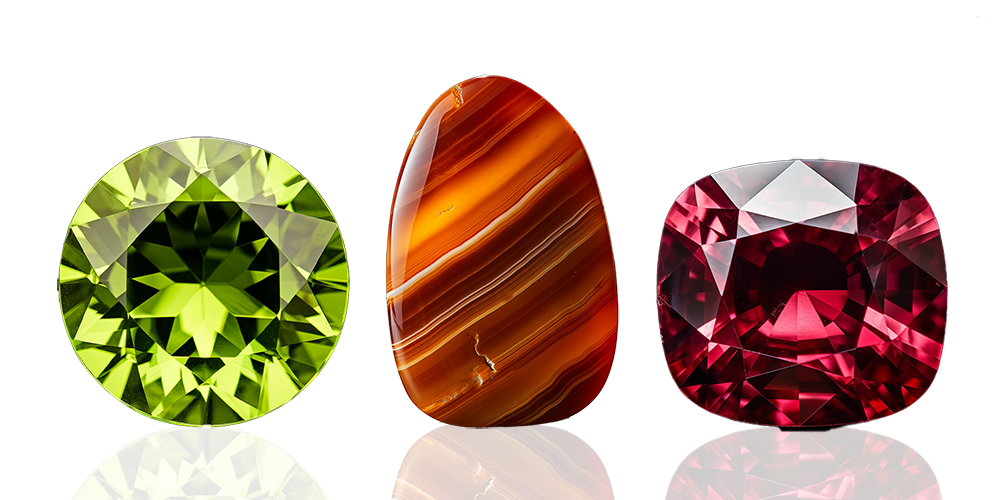
Peridot, Spinel, & Sardonyx, Chosen Specifically for August
Why Does August Have Three Distinct Birthstones?
August, just like June, has the unique distinction of having three birthstones each. But why does August boast this trio?
The Jewelers of America and The American Gem Trade Association designated sardonyx, peridot, and spinel as the official birthstones for August. Initially, sardonyx was the sole birthstone for this month. However, due to its frequent confusion with peridot because of their similar color ranges, peridot was later added as a second August birthstone. Then, in August 2016, spinel was introduced as the third official gemstone, embracing a more contemporary approach to birthstones.
Eager to uncover more about the captivating world of birthstones? Dive deeper with our Ultimate Birthstone Guide!

The Sparkle of Sardonyx
Origins & Features of Sardonyx
The traditional birthstone for August, Sardonyx, boasts a rich and ancient history. Its name derives from the Greek words “sard,” meaning “reddish-brown,” and “onyx,” meaning “veined gem.”
As a result, sardonyx is typically a reddish-brown veined gemstone, although it can also appear in a variety of colors, including yellow, brown, purple, black, white, and grey.
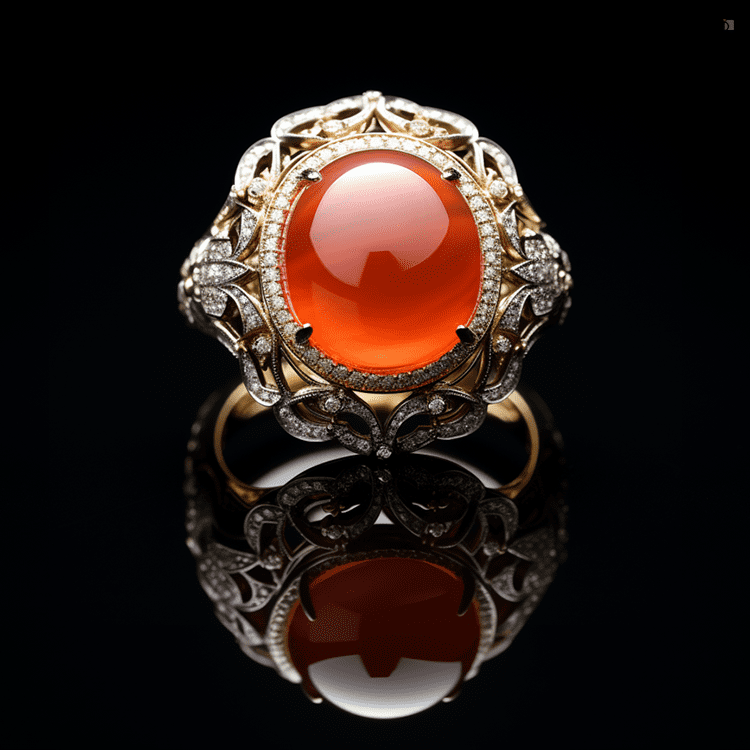
Today, sardonyx is predominantly found in Brazil, Germany, Madagascar, and the United States. These regions are known for producing high-quality sardonyx, showcasing its distinctive veined patterns and rich colors.
Generally speaking, the more distinct the bands are on sardonyx, the more valuable it is considered.
Sardonyx gemstones are typically found in the Earth’s crust, particularly in regions with volcanic and metamorphic activity. These regions provide the necessary conditions for the formation of sardonyx, which is a variety of chalcedony, a cryptocrystalline form of silica.
When Sardonyx Became August’s Official Birthstone
Long before the modern birthstone list was established, sardonyx held its place as the original birthstone for August. Its association with the month dates back over 4,000 years to ancient civilizations such as the Greeks and Romans. When the American National Retail Jewelers Association formalized the birthstone list in 1912, sardonyx was included as the traditional gem for August. Though peridot and, more recently, spinel were later added to the list, sardonyx remains the most ancient and historically rich of August’s birthstones.
The Rich History and Deep Symbolism of Sardonyx
Cultural Significance and Fun Facts: Sardonyx in Lore and Legend
The history of sardonyx stretches back to the Second Dynasty of Egypt, around 4,000 years ago. However, its popularity soared during the era of the Ancient Greeks and Romans. Warriors wore sardonyx talismans engraved with heroic gods, believing they would provide courage, protection, and victory in battle.
Romans also used sardonyx for rings and seals due to its unique property where hot wax did not stick, making it ideal for imprinting wax on official documents. Roman women believed that wearing sardonyx would attract love due to its fiery red shades. In Renaissance times, sardonyx was associated with eloquence, believed to enhance communication and clear thinking. Public speakers often wore it for this reason.
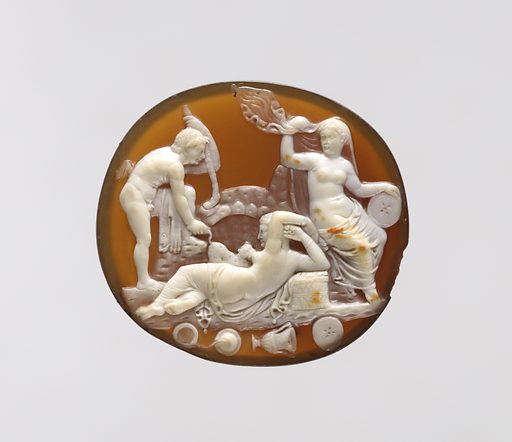
Symbolically, sardonyx represents courage, protection, and clear communication. In the Middle Ages, it was thought to counteract the negative effects of onyx, believed to bring sadness, anger, and anxiety. Sardonyx was also placed at the corners of homes to ward off evil.
Buying the Right Sardonyx For You
When selecting the perfect sardonyx, it’s important to consider the key elements of Color, Clarity, Cut, and Carat—but with a particular emphasis on the stone’s signature banding. Sardonyx is valued for its striking contrast between the reddish-brown layers of sard and the white bands of onyx, with vibrant color separation and well-defined lines being the most desirable traits. The most prized sardonyx stones showcase bold, continuous patterns with minimal imperfections, often cut as cabochons or carved into cameos to highlight their natural layering.
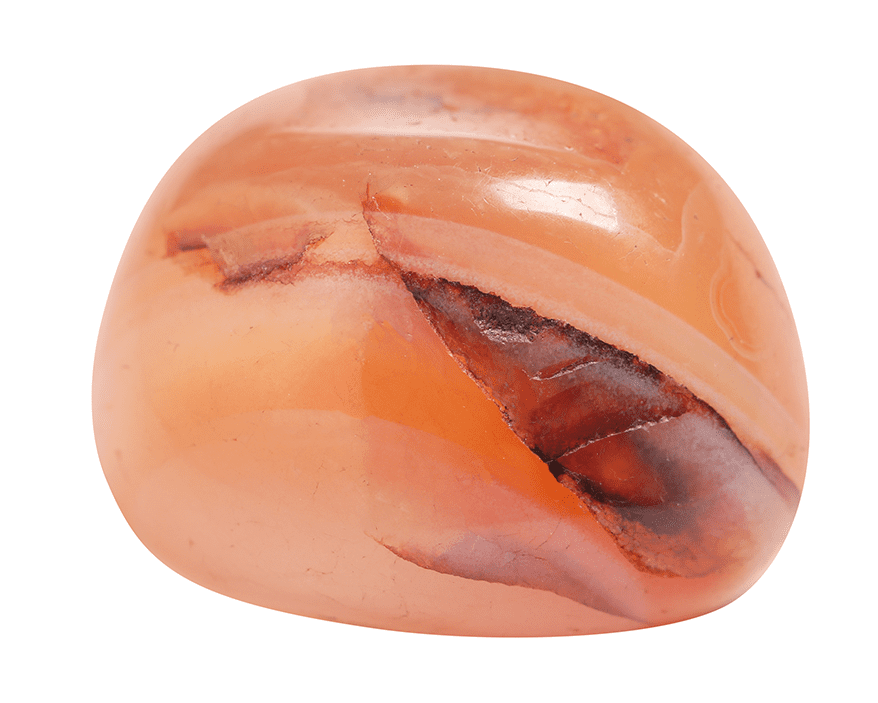
While larger stones can be impressive, smaller pieces with vivid color and clean banding may hold greater value. As with all gemstones, purchasing from a reputable source ensures authenticity, especially when it comes to potential treatments, making your sardonyx selection both a meaningful and visually captivating choice.
If you or someone you know was born in August, Sardonyx is a wonderful choice for August birthstone jewelry pieces. This gemstone is also associated with the 7th and 10th years of marriage, making it a perfect choice for celebrating this special anniversary with a unique and meaningful gift
Essential Tips for Maintaining and Caring for Your Sardonyx
Understanding Proper Sardonyx Care
Sardonyx has a hardness of 6.5 to 7 on the Mohs scale. To put this in perspective, quartz, which has a hardness of 7 – 7.5, is present in the dust particles that float in the air and settle on uncleaned surfaces in your home. These particles can remove the polish from your table and the finish from your car. Diamonds, the hardest gemstone, have a hardness of 10, while talc, the softest, can be scratched by a fingernail.
Sardonyx gemstones are relatively durable, but proper care is essential to maintain their luster. To keep your sardonyx jewelry looking its best, store it separately from other pieces to avoid scratches. Clean it gently with a soft cloth and avoid harsh chemicals that can damage the stone. Ultrasonic and steam cleaners should be used with caution when cleaning your sardonyx jewelry.
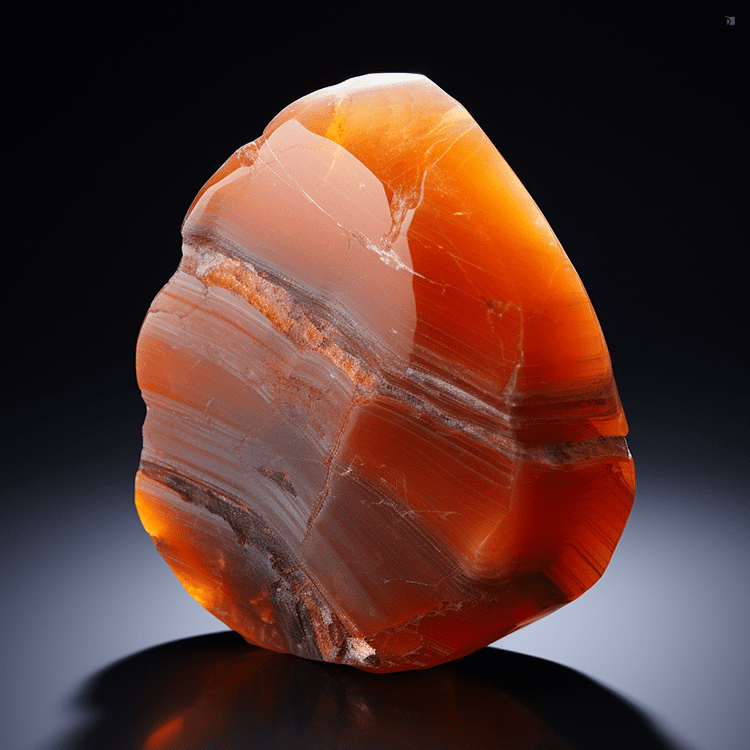
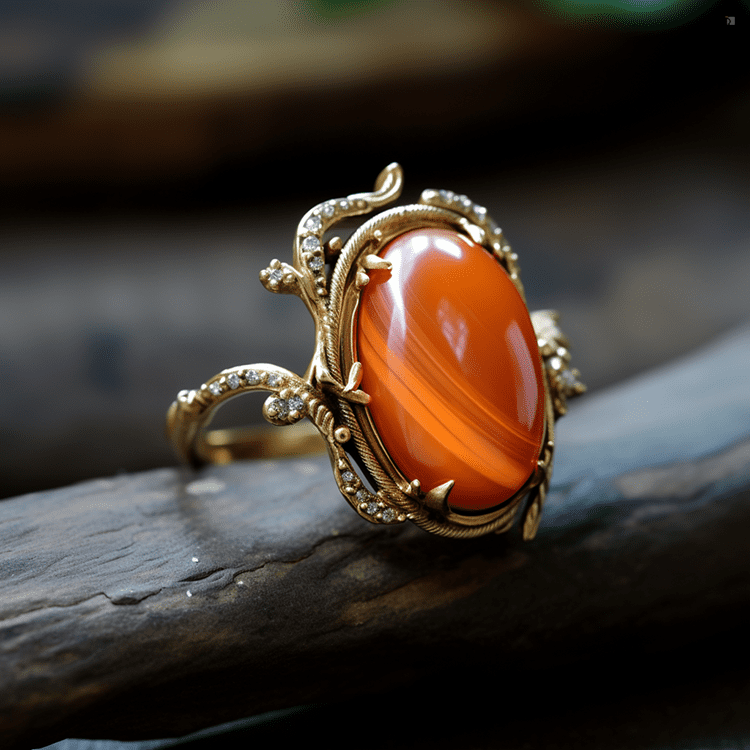

The Perfection of Peridot
Origins & Features of Peridot
Peridot, the first modern birthstone for August, is renowned for its captivating shades of green. The name “peridot” comes from the Arabic word “faridat,” meaning “gem.”
This gemstone’s color can range from deep olive green to pale yellow-green, determined by the amount of iron within its crystal structure.
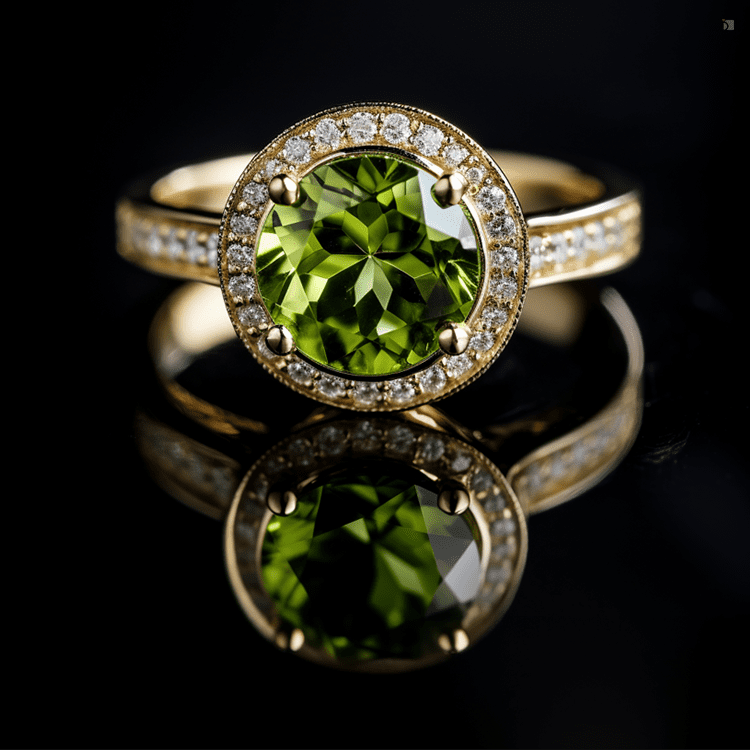
Today, peridot is predominantly found in the United States (Arizona), China, Pakistan, Myanmar, Vietnam, Norway, Australia, Egypt, Hawaii, and Tanzania. These regions are known for producing high-quality peridot, showcasing its vibrant green hues and exceptional clarity.
The most expensive peridot color is deep green.
The highest-quality peridot exhibits a rich, vivid green hue with a strong, intense color saturation. The most prized peridots have a deep, evenly distributed green that is free of yellow or brown undertones, often referred to as “fine peridot.”
Uniquely, peridot is found in the Earth’s mantle, unlike most gemstones that are discovered in the Earth’s crust. Additionally, trace amounts of peridot have been identified at meteorite crash sites, indicating its presence in space.
When Peridot Became August’s Official Birthstone
Although the tradition of linking gemstones to specific months dates back to ancient civilizations, it wasn’t until the early 20th century that a standardized list of birthstones was established. In 1912, the American National Retail Jewelers Association—now known as Jewelers of America—released an official list, naming peridot as the designated birthstone for August.
Prior to this, peridot had already been a favored gem for the month thanks to its vibrant green hue and historical associations with protection and prosperity. Its connection to volcanic origins and lava flows also made it a fitting choice for August, a month known for its summer heat and fiery energy. Since then, peridot has remained a timeless symbol of warmth, growth, and renewal for those born in the eighth month of the year.
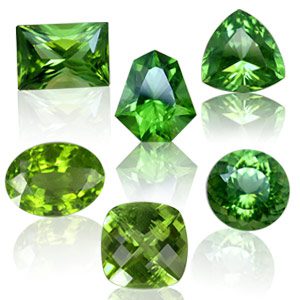
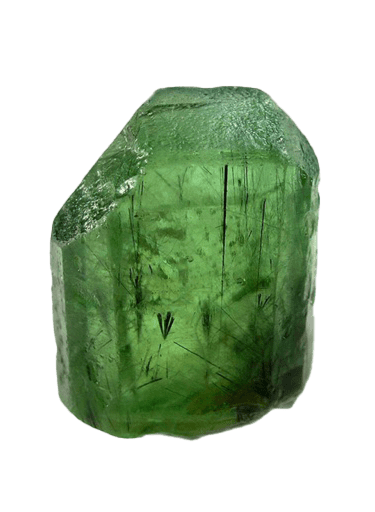
The Rich History and Deep Symbolism of Peridot
Cultural Significance and Fun Facts: Peridot in Lore and Legend
Peridot is a gemstone steeped in symbolism and legend. Representing peace, good health, harmony, and restful sleep, it is known as the gemstone of compassion and tranquility. When set in gold, peridot is believed to protect the wearer from bad dreams and is thought to aid in alleviating depression and improving strained relationships. In Christian folklore, peridot symbolized purity and chastity, often adorning high-ranking officials of the Catholic Church. In Hawaii, peridot is linked to Pele, the goddess of fire, symbolizing her tears.
The enchanting history of peridot dates back to 1500 B.C. on the volcanic island of Zabargad in the Egyptian Red Sea. So beloved was this apple-green gemstone by the Ancient Egyptians that they kept the island’s location a closely guarded secret. They nicknamed peridot the “gem of the sun,” believing it could protect them from the terrors of the night.
Cleopatra’s famed emerald collection may have actually been peridot, as some historians believe. The Ancient Egyptians and Cleopatra were renowned for their love of emeralds, yet many of these so-called emeralds might have been the similarly green peridot. In medieval times, the confusion persisted, with people often mistaking peridot for emeralds. This mix-up extended to Germany’s Cologne Cathedral, where what were believed to be 200-carat emeralds were later revealed to be peridot.
If you or someone you know was born in August, peridots make a stunning alternative to traditional birthstone jewelry pieces. This vibrant gemstone is also associated with the 16th year of marriage, making it a perfect choice for celebrating this special anniversary with a unique and meaningful gift.
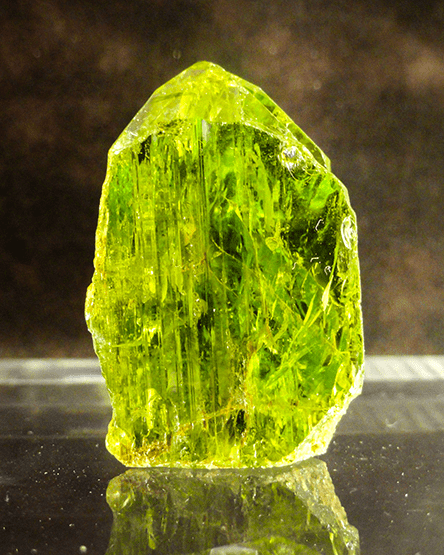
Buying the Right Peridot For You
When choosing the perfect peridot, it’s important to consider the Four C’s: Color, Clarity, Cut, and Carat—but with an emphasis on the gemstone’s vibrant green hue. The most desirable peridots feature a rich, lime-to-olive green with no brown or yellow undertones, especially in larger stones over 10 carats.
In terms of clarity, high-quality peridot should be eye-clean, free of visible inclusions that can diminish its value and brilliance. A well-executed cut—often in shapes like emerald or oval—can amplify the gem’s sparkle and showcase its lush color. While peridot is rarely treated, naturally vibrant and untreated stones from premium sources are especially prized by collectors and enthusiasts alike.
Essential Tips for Maintaining and Caring for Your Peridot
Understanding Proper Peridot Care
Peridot also ranks a hardness of 6.5 to 7 on the Mohs scale. To preserve peridot’s vivid color and clarity, store it separately from other jewelry to prevent scratches. Clean your peridot gently with a soft cloth and avoid exposing it to harsh chemicals or extreme temperatures. It is not recommended to use steam and ultrasonic cleaners for your peridot gemstones.
Should you need professional cleaning services, feel free to visit our Clean & Polish Services page!
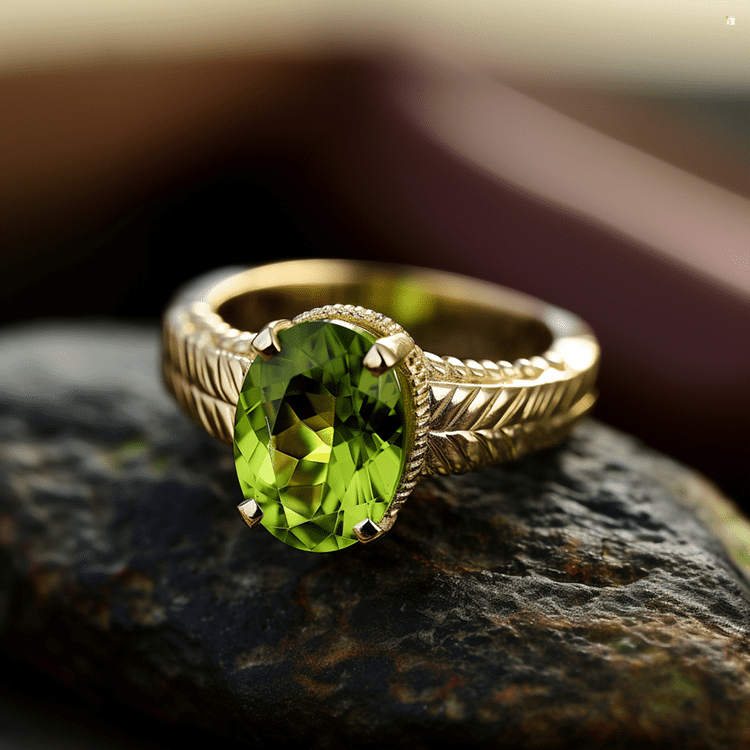
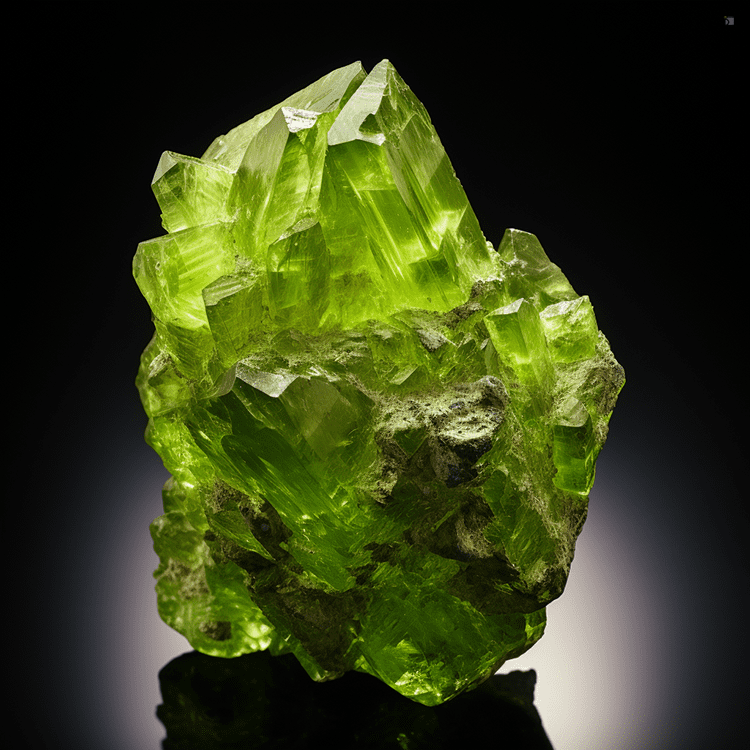

The Splendor of Spinel
Origins & Features of Spinel
Spinel, the second modern birthstone of August, is often hailed as “the most underappreciated gemstone.” Its name is derived from the Latin word “spina,” meaning “thorn,” due to its sharp crystal formations.
Spinel’s vibrant hues and remarkable features have led it to be mistaken for other gemstones, most notably rubies. This gemstone forms in a cubic crystal system and is composed of magnesium aluminum oxide.
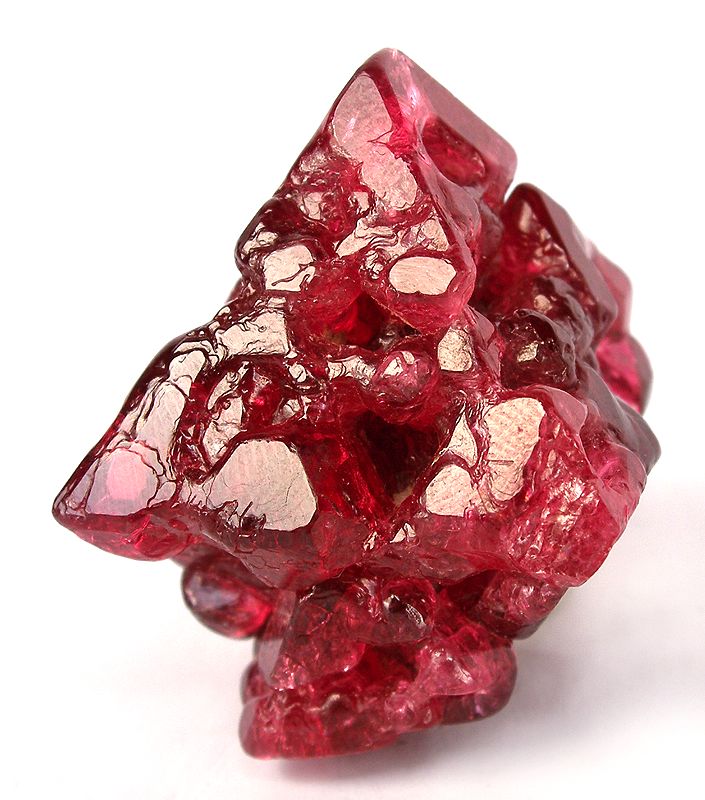
Today, spinel is predominantly found in Myanmar, Sri Lanka, Vietnam, Tanzania, Thailand, Madagascar, Afghanistan, and Tajikistan. These regions are renowned for producing high-quality spinel in a variety of vibrant colors, including red, pink, blue, and more.
Spinel typically forms in metamorphic rocks, such as metamorphosed limestone and dolomite, and can also be found in granite pegmatites. Additionally, spinel is often discovered in alluvial deposits, where it has been eroded from its original rock matrix and transported by water.
Spinel can be found in virtually every color of the rainbow.
Spinel gemstones can be found in a wide array of colors, including red, pink, orange, yellow, green, blue, purple, brown, black, white, gray, and even clear. The various colors of spinel are a result of trace elements within its structure: red spinels get their color from chromium, while blue spinels owe their hues to iron, with the most vivid blues coming from cobalt.
When Spinel Became August’s Official Birthstone
Although spinel has long been admired for its rich color and striking resemblance to ruby, it wasn’t officially recognized as an August birthstone until recently. In July 2016, The Jewelers of America and the American Gem Trade Association (AGTA) added spinel to the official list of birthstones for August, making it the third gem associated with the month. Before this addition, August was represented solely by peridot and sardonyx. The inclusion of spinel acknowledged its growing popularity and the gem’s unique beauty, particularly in its vivid red and cobalt blue varieties. Today, spinel offers August-born individuals a sophisticated and rare alternative, adding both color diversity and historical intrigue to the birthstone lineup.
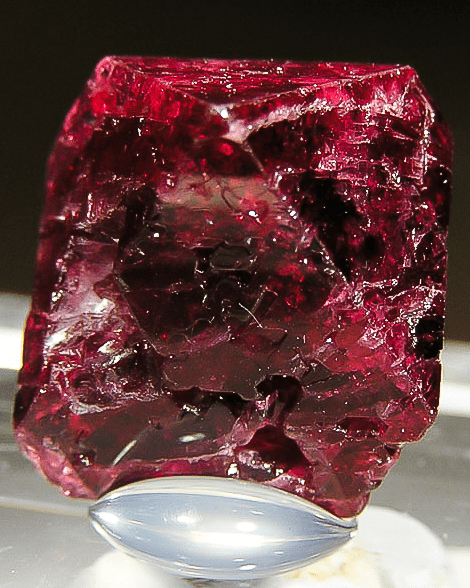
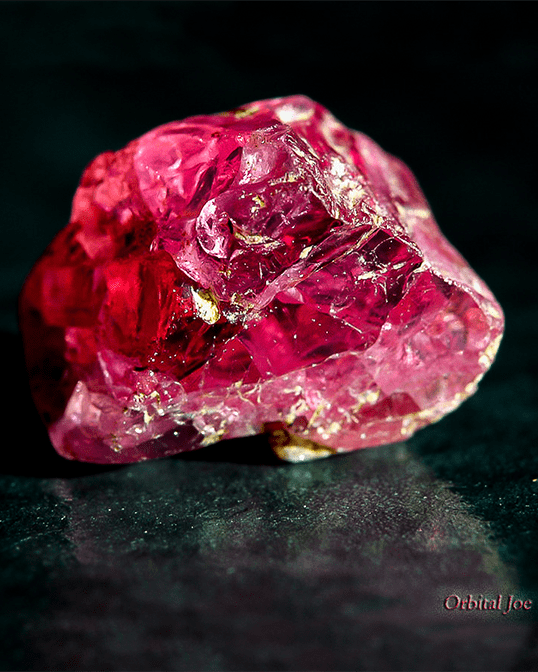
The Rich History and Deep Symbolism of Spinel
Cultural Significance and Fun Facts: Spinel in Lore and Legend
Spinel is a gemstone steeped in rich symbolism and fascinating history. Often considered “the most underappreciated gemstone,” spinel is believed to symbolize passion, longevity, and devotion. Its vibrant colors and enchanting properties are thought to surpass even diamonds as the ultimate “gemstone of love.” Spinel is also renowned for boosting energy, stamina, memory, and cognitive abilities, with urban legends suggesting it can enhance intuition and mental clarity, aiding communication with higher powers.
First discovered in Buddhist tombs in Afghanistan dating back to 100 B.C., spinel has a storied past. Historically, large spinel crystals mined in Southeast Asia were known as “Balas Rubies.” These gems, often mistaken for rubies due to their similar red hue, adorned the treasuries of emperors and kings, who were unaware that these prestigious “rubies” were actually spinels.
One of the most esteemed spinel gemstones is the “Black Prince’s Ruby.” In 1367, Prince Edward of Wales received this magnificent crimson-red spinel as a gift for a battle victory.
This gem, cherished by many English monarchs, survived WWII bombing raids, fires, and theft. Its rich history and remarkable resilience eventually earned it a place as one of the centerpieces of England’s Crown Jewels, valued today between $4-$6 billion.
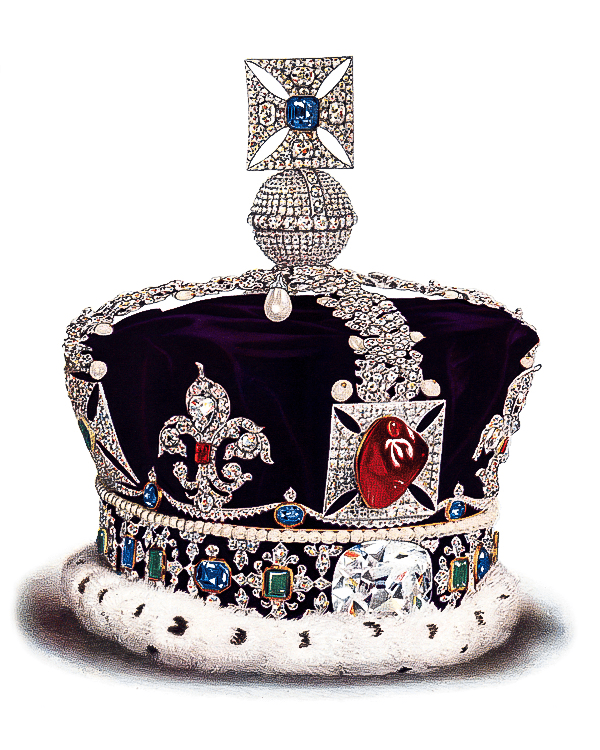
Despite its rarity and growing popularity, spinel remains surprisingly affordable due to historically low demand in the jewelry market. However, as more people discover its unique charm and historical significance, spinel’s status as a beloved gemstone continues to rise.
Buying the Right Spinel For You
When selecting the perfect spinel, it’s essential to consider the foundational Four C’s: Color, Clarity, Cut, and Carat—though color plays an especially dominant role in determining a spinel’s value. Unlike many other gemstones, spinel offers a vibrant palette, with red and cobalt-blue varieties being the most sought after.
The intensity and saturation of color are critical, as vivid hues—especially those that resemble fine rubies or sapphires—can significantly increase a stone’s worth. In addition to color, eye-clean clarity and larger sizes are prized, with fine-quality spinels over a few carats being particularly rare. As spinel is not always accompanied by certification, buying from a reputable and knowledgeable seller is key to ensuring authenticity, origin transparency, and long-term value.
If you or someone you know is celebrating a 22nd wedding anniversary, spinel makes a stunning and unique gift choice. This vibrant gemstone is not only beautiful but also rich in symbolism, making it a perfect way to honor such a special milestone with a meaningful and memorable piece of jewelry!
Essential Tips for Maintaining and Caring for Your Spinel
Understanding Proper Spinel Care
Spinel ranks a hardness of 8 on the Mohs scale, just like rubies and emeralds do. Spinel gemstones are durable and retain their brilliance with proper care. To keep your spinel jewelry looking its best, store it separately to avoid scratches and clean it gently with a soft cloth, steering clear of harsh chemicals or extreme temperatures. While ultrasonic and steam cleaners are generally safe, they can be problematic if the stone has fractures or inclusions. The safest method is to clean spinel with warm soapy water.
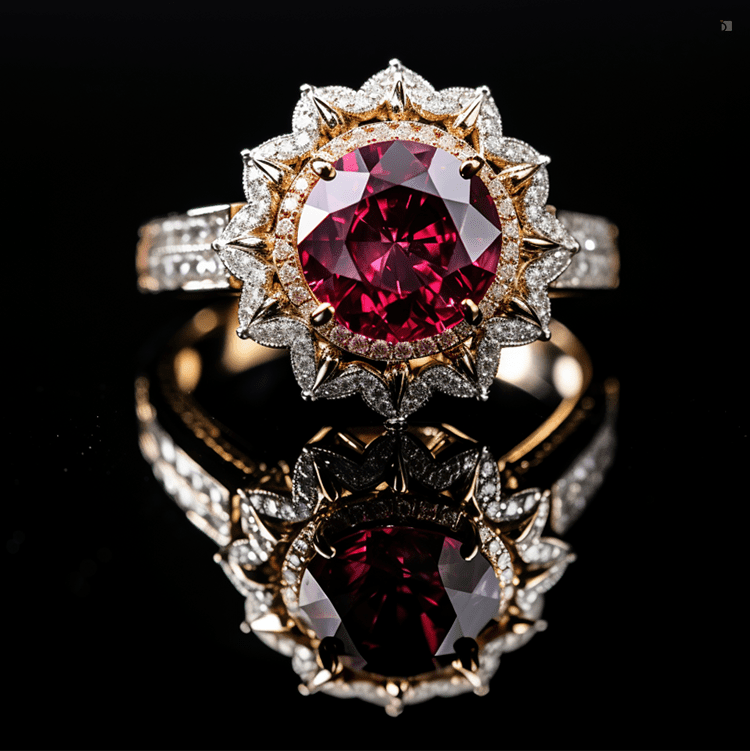
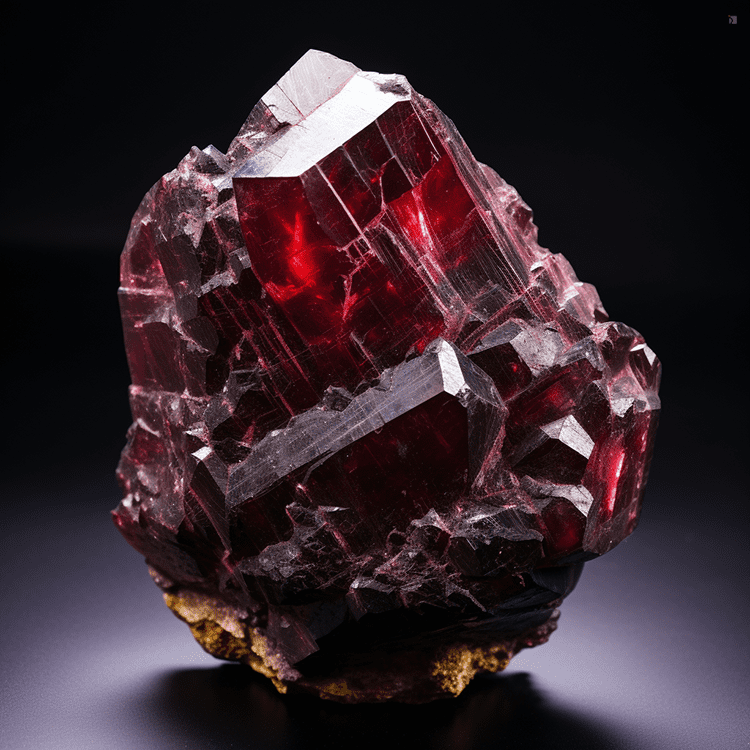

Revive Your Treasured Sardonyx, Peridot, or Spinel Jewelry
Are you considering the restoration of a beloved piece of birthstone jewelry? You’ve found the perfect place to revive cherished memories.
Don’t let a chipped gem diminish your jewelry’s sparkle! Gemstones are the heart of any piece, but even the most dazzling stone can show wear over time. Whether your Peridot pendant has lost its luster, your Spinel ring needs a new stone, or your Sardonyx earrings have a scratch, we can revitalize your treasured pieces.
We specialize in bringing your jewelry back to life. Our team of experts meticulously sources the perfect gem to match your precious item. We understand that each gemstone is unique, deserving specialized care. That’s why our Professional Stone Sourcing team ensures every replacement, no matter how seemingly insignificant, matches the original’s quality and fit. Imagine your jewelry sparkling like new! We’re committed to making your cherished pieces shine as brightly as the day you first fell in love with them.
Explore our Gemstone Replacement Services page to learn more about how we can help restore your Peridot, Spinel, or Sardonyx to its former glory.
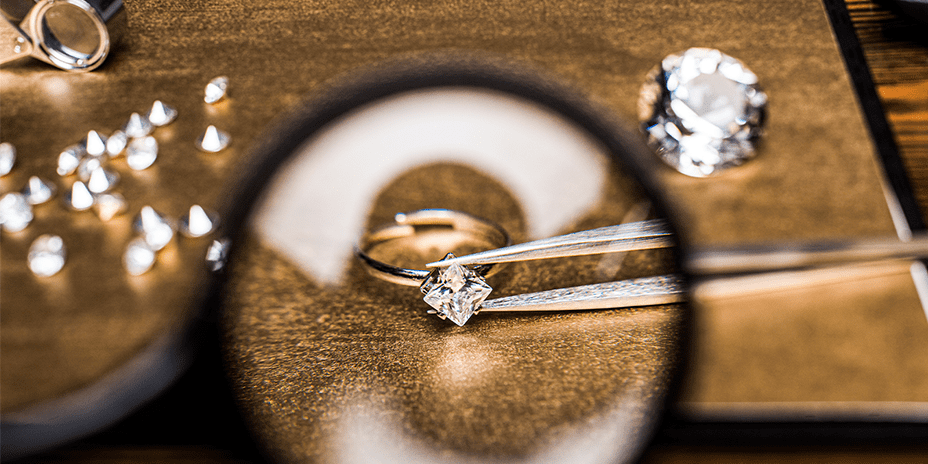
Originally Published July 25, 2022, Updated and July 30, 2025

Resources:
- ¹Spinel Gemstone by Robert M. Lavinsky via Wikimedia Commons: https://commons.wikimedia.org/
- ²Spinel Crystal by Orbital Joe via Flickr: https://www.flickr.com/
- August Birthstone Information: https://www.americangemsociety.org/
- August Birthstone Information: https://www.gia.edu/
- August Birthstone Information: https://www.gemsociety.org/
- Blog outline and revising assisted by AI resources such as Google Gemini.
Have Questions?
The Ultimate Birthstone Guide
“If you were born in August, your month’s birthstones are Sardonyx, Peridot, and Spinel.
If you didn’t already know, there are some months that have multiple birthstones, whereas some only have one. Traditional birthstones are gemstones that were most commonly associated with its respective month in the early 20th century and even beyond, with Ancient Greek and Roman philosophers associating these gemstones with the star signs. Those that are more commonly known in this day and age are the modern birthstones, which were officially named by the Jewelers of America in the 1950’s.
If you would like to learn more about birthstones in general, visit our Ultimate Birthstone Guide!“
Clean & Polish Services
“A basic clean, polish, and inspection is part of the routine care and maintenance needed to keep your jewelry looking like new. The inspection process includes looking for loose stones, bent prongs, and any damage to the metal or stones that need to be repaired.”
Stone Setting Repair
“A stone setting repair can be a simple re-tipping of a worn prong (which is considered routine care and maintenance) or the complete rebuilding/replacing of a damaged prong. In the case of severe damage, the entire head of the ring may need to be replaced.
Regardless of whether or not the prongs are compromised due to normal wear and tear or a result of accidental damage, we can provide the routine care and maintenance in order to ensure you do not lose a stone in your setting.”
Gemstone Replacement Services
“The process of a Gemstone Replacement is simple enough, yet requires trained eyes to be able to make a flawless switch. We aim to leave no trace of our work, which means not only will your setting be perfected, but the gemstone we choose will complete your jewelry piece effortlessly.”
Explore the Magic of Our Gemstone Services!
We are proud members of the

Our team includes gemologists certified by

